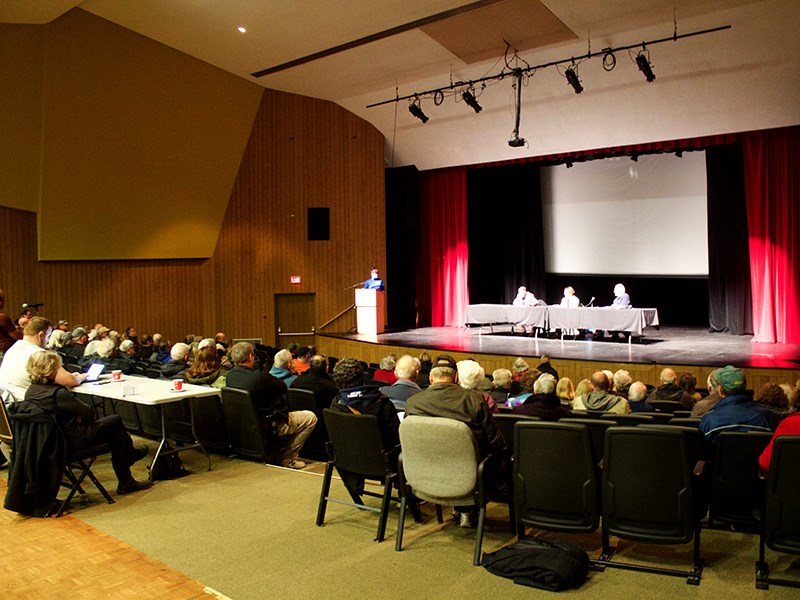Approximately 100 Powell River residents gathered for a town hall meeting on gas prices at Evergreen Theatre on Sunday, December 15.
Powell River-Sunshine Coast MLA Nicholas Simons, North Island-Powell River MP Rachel Blaney and former Powell River mayor Colin Palmer sat alongside Powell River Living editor Pieta Woolley as panelists, and heard residents read statements explaining how high gas prices have affected them.
The goal of the meeting, explained Woolley, was to better inform elected representatives about how to best advocate for change. She noted that Powell River currently has some of the highest unexplained gas prices in Canada.
Prices were hovering for months at around $1.59 per litre: 25 cents higher than in neighbouring jurisdictions on Vancouver Island. That price difference, according to Woolley, costs Powell River families “around $100 per month.”
According to a handout distributed at the meeting, unexplained factors in the price differential include the cost of ground transportation in Vancouver, fuel importing costs and extra amounts charged by gas stations.
Simons said he plans to ask the BC Utilities Commission (BCUC) to investigate Powell River gas prices specifically, while Blaney said she will ask the federal Competition Bureau to investigate for anti-competitive practices in the region.
“It’s important we assure this government, federally, that this is a very significant issue,” said Blaney. “This will really help me bring the voices forward from this region and let [minister of innovation, science and economic development Navdeep Bains] know.”
Blaney noted that gas prices are lower in remote regions such as Nunavut than in Powell River, despite claims that prices are higher in Powell River because of logistical costs.
Simons said the issue of high gas prices was “about fairness,” and that he thinks “we’re being gouged.”
Although prices in Powell River came down slightly in November, Woolley said, “the prices still have far to drop.”
Last month, the provincial government passed the Fuel Price Transparency Act, which enables BCUC to force oil and gas companies to hand over supply and pricing data. Palmer expressed concerns that the new law does not stipulate such data will be analyzed by government bodies.
“The legislation is asking either an administrator or a panel or authority to collect data; the legislation does not say anybody is going to analyze the data,” said Palmer. However, he added, “It’s good legislation, because it is a start.”
Palmer also said he thinks the problem lays at the feet of refineries and oil companies, and noted that provinces in Atlantic Canada regulate gas prices
“We might get to that stage; we might not,” he added.
But, Palmer warned, the BC government might have difficulty regulating US-based companies.
Resident Keith Allen expressed similar concerns, arguing that the new transparency law would only explain why prices are high, without actually compelling companies to lower prices. Another resident asked what actions would be taken if companies are found to be gouging consumers. And, several participants said penalties imposed on companies for unfair pricing ought to be significant enough to actually prevent gouging.
Simons said the provincial government would take action if evidence of price-fixing was found, but noted that he thinks current fines imposed by the Competition Bureau for anti-competitive practices seem like “a pittance.”
Blaney agreed with Simons.
“The consequence that federal government is putting forward is not really touching those who have unimaginable resources,” she said. “I’m happy to work with you to fight that one.”
City of Powell River councillor Cindy Elliott suggested that all levels of government should invest more resources in Powell River to address broader affordability issues in the area that are worsened by high gas prices.
Another issue raised was around the Powell River-Vancouver bus service. Former Delta North MLA Guy Gentner, present at the meeting, said more effort should be made to improve bus transportation to alleviate gas costs associated with trips taken in single-passenger vehicles.
“We have a bus system to Vancouver that doesn’t work,” said Gentner. “It’s quite pathetic, frankly.”
Simons encouraged residents to sign a petition at the meeting, and said he would pass on everything he hears from his constituents to provincial cabinet ministers. Blaney said she can take the petition to Ottawa.
“It takes me 25 signatures to stand up in the House of Commons and read out a petition, and I’m happy to do that repeatedly,” she added, “so I encourage you to keep sending them to me.”
Some attendees noted the lack of younger people present at the meeting. Others suggested continuing the discussion on gas prices via social media platforms, which they said would make the issue more accessible to youth.
Small-business owners who attended the meeting described the impact of high gas prices on their livelihoods.
“As a business owner, I’m struggling,” said Shawna Graham. “I’ve been in business for 10 years, and my business has declined immensely, especially in the last three. I deliver flowers, and I rely on gas.”
In their closing remarks, Blaney and Simons thanked attendees for their comments, and said they would continue working on the issue at their respective levels of government.
The town hall was organized by Simons, Blaney and Powell River Living.



